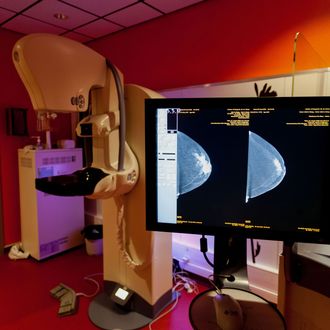
Women should get fewer mammograms — and have them later in life — the American Cancer Society said in the first review of breast-cancer-screening guidelines in more than a decade.
The organization has been recommending mammograms and breast exams every year for women 40 years of age or older since 2003, but now it recommends women start having them at age 45, according to new guidelines published Tuesday in the Journal of the American Medical Association. Women between 45 and 54 years old should be screened annually, but at age 55 they should begin having mammograms every other year, the report says.
The society also clarified that it doesn’t recommend regular clinical breast exams at all, the kind where doctors physically feel for lumps, unless a woman is experiencing unusual breast symptoms. However, it also notes that women should, of course, “have the opportunity” to be screened earlier if they wish. The study is also careful to mention that these recommendations only apply to women with an average risk of breast cancer, not to anyone with a history of the disease.
The reason for the changes, the Times reports, is that mammography is imperfect and often to leads to false-positive results and expensive, nerve-racking additional testing — especially in younger women.
But the new guidelines might be confusing to women who have always thought earlier exams were necessary for earlier detection of the cancer. After all, the American College of Obstetricians and Gynecologists recommends women have mammograms starting at age 40 and clinical breast exams at 19. The American College of Radiology and the Society of Breast Imaging also recommend starting mammograms at age 40. The United States Preventive Services Task Force recommends starting routine screenings even later, at age 50, saying the decision to start earlier “should be an individual one.”
An official at the National Breast Cancer Coalition told NPR, “I think all the American Cancer Society has done is really add to the confusion without helping women make an informed decision.”
Several of these other groups, along with the American Cancer Society, are set to participate in a conference in January in order to form a much-needed consistent set of guidelines.





























